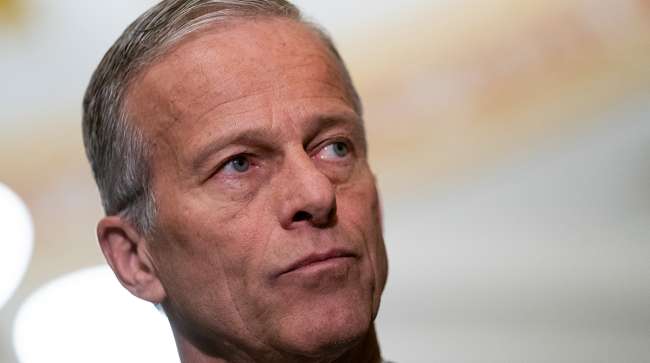“We’re going to continue to stay focused on our agenda,” Thune told reporters March 25. (Allison Robbert/Bloomberg)
WASHINGTON — Ahead of the upcoming Easter recess, consideration of Trump administration nominees and a comprehensive budget and tax bill will dominate the Senate’s agenda, Majority Leader John Thune announced recently.
As early as April, Republicans governing in the majority in Congress plan to reveal drafts of a massive budget reconciliation bill meant to reflect most of President Donald Trump’s domestic policy proposals. Thune (R-S.D.) explained the upcoming reconciliation process would coincide with the chamber’s consideration of senior nominees for top roles at agencies like the Federal Highway Administration.
“We’re going to continue to stay focused on our agenda,” the Senate leader told reporters March 25 while pointing to ongoing efforts to undo certain Biden-era environmental regulations. “And … this week is getting the president’s people into place; continuing the process [of] nominations so the president has his team ready and ready to go to work.”
Sean McMaster and Derek Barrs, nominees to lead FHWA and the Federal Motor Carrier Safety Administration, respectively, await hearings before Senate committees of jurisdiction.

Derek Barrs (left) and Sean McMaster await hearings before Senate committees.
Specific to the budget reconciliation measure — legislation that would require simple majorities for passage in the House and Senate — Republican leaders are aiming to finalize the process before Memorial Day. The transportation policy panels will schedule hearings to draft their contributions to this comprehensive budget procedure.
Thune and House Speaker Mike Johnson (R-La.) are encouraging committee leaders to proceed swiftly on budget negotiations this spring. “House Republicans took the lead and passed a bill to fund the government through the end of the fiscal year. Now, our focus returns to delivering President Trump’s full ‘America First’ agenda,” Johnson said March 24 in a statement with his leadership team.
“The House is determined to send the president one big, beautiful bill that secures our border, keeps taxes low for families and job creators, grows our economy, restores American energy dominance, brings back peace through strength, and makes government more efficient and more accountable to the American people,” the House GOP leadership added.
My joint statement on reconciliation with Leader @SteveScalise, @GOPMajorityWhip, and Chairwoman @RepLisaMcClain along with the House Committee Chairmen involved: @CongressmanGT, @RepMikeRogersAL, @RepArrington,@RepGuthrie, @RepWalberg, @RepFrenchHill, @RepMarkGreen, @Jim_Jordan,… pic.twitter.com/NThqgoASYO
— Speaker Mike Johnson (@SpeakerJohnson) March 24, 2025
Domestic policy themes expected in the budget reconciliation bill include border security, military readiness, the social safety net, domestic energy, supply chain connectivity and extending the Trump-era 2017 tax cuts.
Meanwhile, congressional funding leaders in March kicked off debate on the spending bills for the upcoming fiscal year. House appropriators reviewed fiscal 2026 transportation priorities.
At a Transportation, Housing and Urban Development Appropriations Subcommittee hearing March 26, Appropriations Committee Chairman Tom Cole (R-Okla.) observed, “This subcommittee, as it always has, will continue to ensure safety is an utmost priority in the funding decisions we make. Your agency is a fulfillment of this priority.”
“As we begin the [fiscal year 2026] appropriations process, I look forward to working with my colleagues on both sides of the aisle to responsibly fund the critical safety missions and transportation infrastructure needs of this country,” Cole continued. The fiscal funding process, however, is likely to be marked by partisanship.
Senior Democrats on the Appropriations panel continue to push back on Trump administration workforce updates. On March 26, Rep. Rosa DeLauro (D-Conn.), the Appropriations Committee ranking member, argued, “We are in the middle of a cost-of-living crisis, and Elon Musk and President Trump are making it worse. President Trump promised to fight for the working class — to make Americans healthier and safer and lower the cost of health care — but instead, he put Elon Musk and billionaires in charge of the government.”
Funding authority for most of the Department of Transportation and other federal agencies expires Oct. 1.






